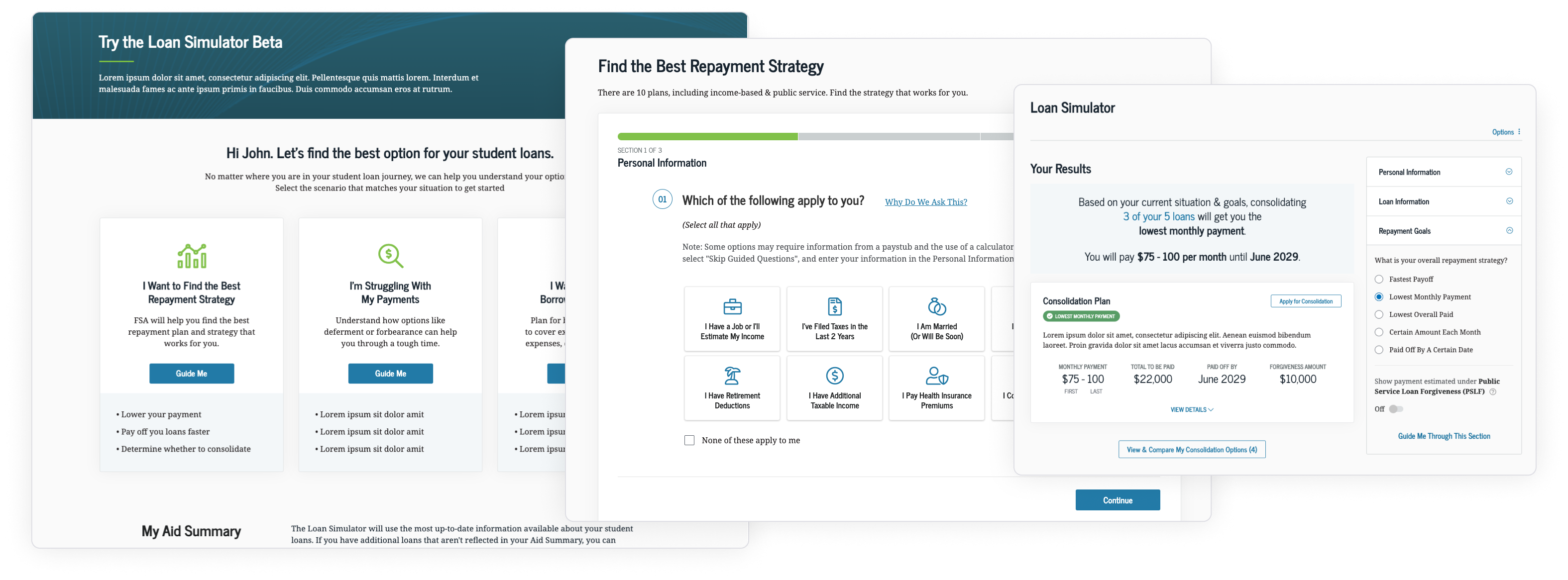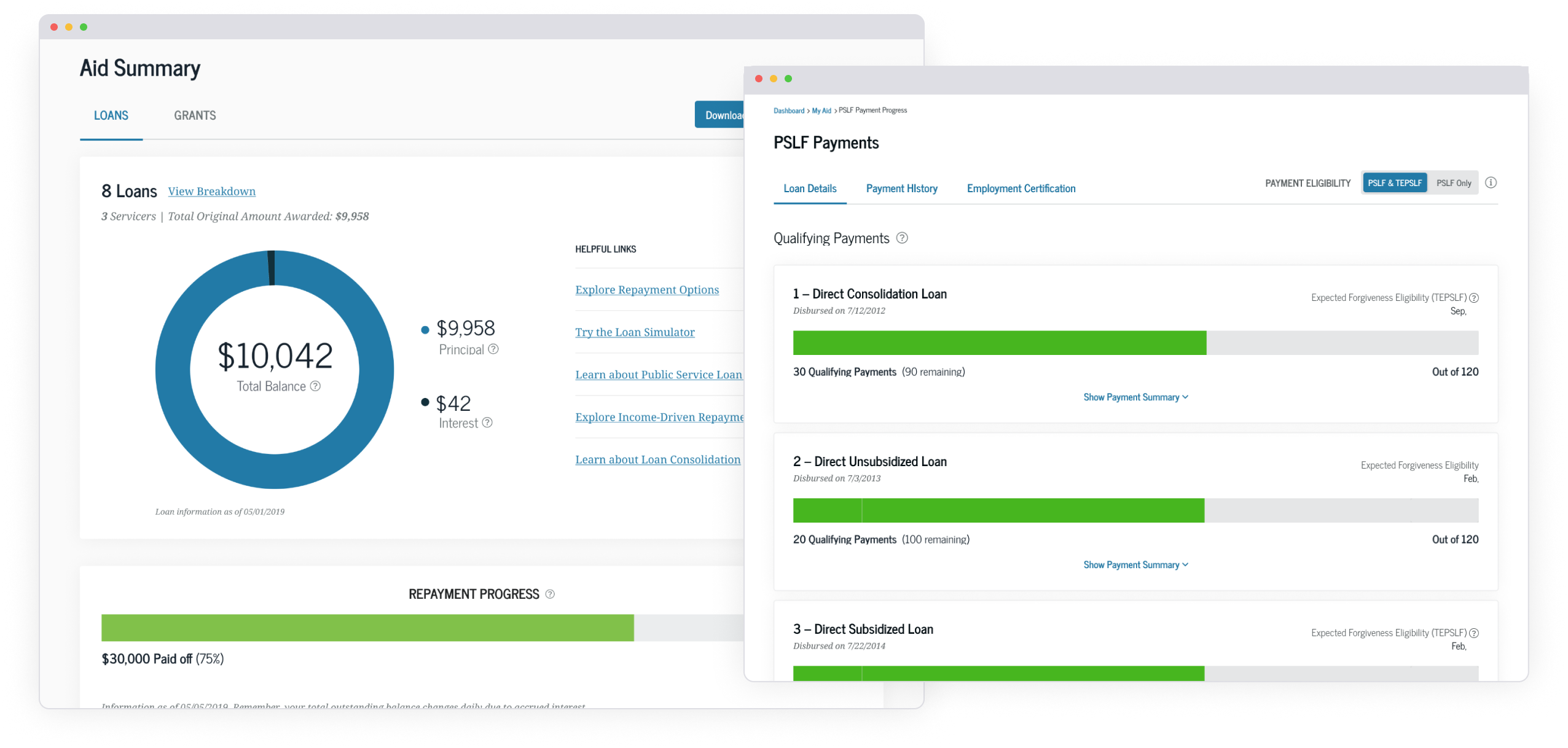
StudentAid.gov Revamp
Reimagining the student aid experience so that we may help people make better and smarter decisions about their student loans
.png)
Overview
Methods & Tools
- Prototyping and design system creation
- Journey mapping, and user flow diagramming
- User research
- Workshop crafting and facilitation
- Client management
Role
Product Designer
Timeframe
1 year
Delivery & Impact
35+
Redesigned Features
355
Usability Tests Conducted Across All Platforms
1
Holistic Design System Created
Background
One of the scariest things about student loans is you can't make any mistakes.
"Student Loans" – Patriot Act with Hasan Minhaj. 2019, Netflix.
As of 2021, more than 44.7 million Americans owe over $1.75 trillion in student loan debt, which is now the second highest consumer debt category after mortgage debt.
With the student loan debt crisis worsening, the Office of Federal Student Aid (FSA) is answering the call for better protection of students and borrowers by increasing transparency and accountability, while simplifying the end-to-end student loan process.
I was part of an ambitious project to reimagine the student aid experience so that borrowers are empowered to make better and smarter decisions about their student loans.
The Challenge
How might we empower borrowers to make informed decisions about their student loans amidst the growing debt crisis?
1
Discovery Research
At the start of our project, we dove deep into the world of federal student aid. We wanted to truly understand the student aid lifecycle and the hurdles borrowers face. We interviewed FSA stakeholders and financial aid administrators, sifted through existing research, and took a close look at FSA’s websites and analytics. By the end of this discovery phase, we pinpointed key issues, organized the project into manageable sprints, and set the stage for a fresh design system.

9
Borrower Interviews
500
Market Research Survey Respondents
50+
Customer Support Call Recordings Reviewed
Key Themes
Customers have to visit numerous information sources and use multiple log-ins to retrieve their financial aid information, causing frustration and introducing potential drop-off points.
Customers as young as 17 agree to financial commitments and make decisions that impact their lives without fully understanding basic loan concepts and repayment responsibilities.
Customers unfamiliar with repayment options are less likely to strategize about repayment, be proactive about their loans, or make the best decisions for their financial situations.
Customers will go to a non-Federal Student Aid website in search of answers or give up on the process altogether when they are confused.
Customers have limited visibility into the tracking and processing of applications, making it challenging to know where to look for accurate and timely information.
3
Design Solutions
Single Point of Entry
We created a unified digital platform that consolidates 7 legacy websites, providing borrowers with a seamless entry point to services through the StudentAid.gov website.

.png)
Off Script
So so many conversations about API limitations 😫.
Personalized Dashboard
Navigating the student aid process can be overwhelming due to its complexity and the risk of missing deadlines or making errors. To help address this, we designed a student aid dashboard that provides a comprehensive view of the customer's aid status. It also features checklists for each stage of the aid journey and timely reminders for important deadlines.

Loan Simulator
One of the most significant achievements of this project was the design and development of the Loan Simulator. I spearheaded the design efforts, crafting a highly intricate Axure prototype with fully functional logic.
The Loan Simulator is a user-friendly tool designed to help borrowers find the best repayment plan tailored to their specific needs and goals. It guides users through a series of questions about their income, tax status, desired loan amount, and repayment objectives. The tool then calculates a personalized repayment plan, detailing the pros and cons, estimated monthly payments, and other options to consider.
Try the Loan Simulator!

Aid Summary
Previously, if you wanted to check your balance, see the breakdown of principal and interest, or view all your loans and grants, you had to visit both studentaid.gov and the National Student Loan Data System (NSLDS). Now, everything is in one place! You can easily monitor your repayment progress, get alerts about your account, and keep track of your remaining eligibility for Direct Loans and Pell Grants.
Update: In 2023, I took the lead in revamping the Aid Summary to include tracking for Public Service Loan Forgiveness (PSLF) and TEACH Grant data. Now, you can easily see how many qualifying payments you've made towards the PSLF program and keep tabs on your TEACH Grant service commitments.

Help Center
To enhance self-service and boost financial literacy, the site now offers a comprehensive search function and a new Help Center. This Help Center organizes content into intuitive categories and highlights the top ten most frequently asked questions.

Design System
FSA previously lacked of a cohesive design system, resulting in inconsistencies across their websites. To address this, we conducted a thorough audit of their visual and language elements to identify which components could be standardized. In the early stages of the project, I championed the importance of establishing a design system ASAP. I initiated the creation of a basic design system closely aligned with the USWDS framework and advocated for hiring a full-time designer to manage it, which we successfully did a few months into the project.
.png)
Off Script
Having a designer 100% allocated to managing the design system is extremely important, especially during the earlier stages of a project.
4
Outcomes
In the first 12 months after deployment, FSA achieved the following results:
220M+
visits to StudentAid.gov
23.8M
Completed Forms & Flows
2K+
Pages Consolidated
134M
Total Users
1.58B
Total Pageviews
35.9%
Mobile Device Usage

